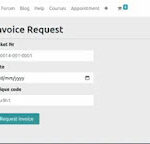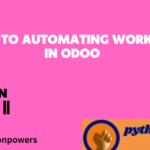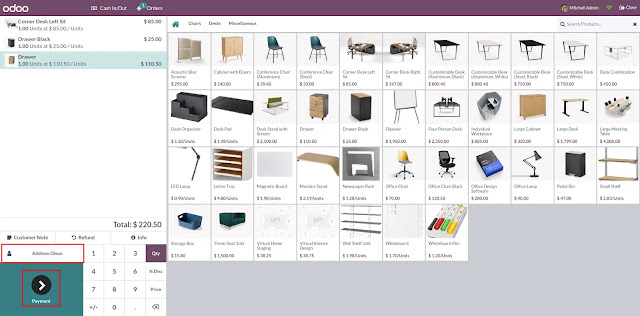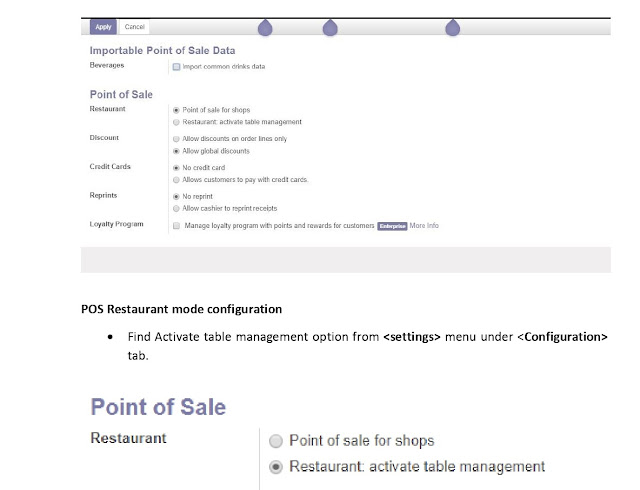Odoo Point of sales
The shopping and consumption characteristics of consumers are changing rapidly. Unlike in the past, the customers don’t have much time to spend in shops to find their desired product. Consequently, E-commerce sales are rising. Modernization and digitalization in every possible point will make shopping more interesting and hassle-free. ‘Point of Sale’ is an opportune place where you can utilize this digitalization technique to give an excellent customer experience. POS is the place at which a retail transaction is carried out. Generally, billing and final adjustments are made at this point. Odoo POS module combined with hardware components like the barcode scanner, POS box, etc. perform the sales procedure.
Most of the present ERP systems provides Point of Sale option with varying configurations. Apart
from speedy billing option, an excellent POS can facilitate functionalities like, discount and
Loyalty programs support, multiple payment type support, serve multiple customers at a time
and customer specific management, Accounting etc. To enable features like this, a POS system
must be integrated with CRM, Inventory, Accounting and other necessary modules in the ERP.
The detailed analysis report is another must-have feature in every POS system. Sales analysis on
each POS is the key factor to take sales improvement decision.
Odoo POS is an excellent ERP were you can find all these features by default. Moreover many
add-ons and apps from Odoo app store further enhance the capabilities of Odoo POS like in every
other module. The Simple and user-friendly interface of Odoo Point of sales module lets the user
configure and complete his all sales needs with hassle-free steps.
Some of the feature [15] which makes Odoo a well performing POS app are;
. Payments
Payment methods
Cash, checks, and credit card payment methods are available. New types of payment
methods can be added as well.
Credit/Debit cards
All electronic payments are handled by external payment terminals.
Split tenders
A single order can be paid as a split payment between multiple parties as well as with
separate payment methods.
Currency rounding
Prices and payments can be rounded to the smallest denomination of the currency.
Offline payments
Orders made offline are automatically synchronized when you are reconnected.
Invoicing
Generate and print invoices for your business customers
Accounting
Payments are directly integrated into Odoo Accounting to make bookkeeping simple and
reliable.
Customer tips
Generate and print invoices for your business customers.
. Checkout
Prices & discounts
Set customer prices or offer percentage-based discounts on either a single product or
the entire order.
Parallel orders
Put orders aside and process multiple orders at the same time.
Customized receipts
Advertise your current promotions, hours of operation, and upcoming events on your
printed receipts.
Weighting at the counter
Calculate product weight during checkout with the electronic scale integration
Blazing fast search
Quickly find your customers and products with the built-in search features.
Sell on the move
With iPad and Android tablet support, sell anywhere within your store or restaurant.
Dynamic barcodes
Embed price, weight, and discount information directly into your barcodes
. Store Management
Order history
View all past orders as well as search by customer, product, cashier, or date.
Daily sales
Keep track of daily sales and totals for every payment type.
Cashier accounts
Manage multiple cashier accounts and secure them with badges or pin codes.
Cash flows
Monitor cash register adjustments and easily verify cash contents at the end of the day.
Stock & Inventory
Monitor your stock in real-time, manage your inventory across all locations, and review
shipments with the Odoo Stock integration.
Franchises
Pre-configure your franchises stores, overview their sales, and centrally manage their
stock and accounting.
. Customer & Loyalty
Register customers
Identify your customers by simply registering their email and contact address, allowing
you to offer discounts and keep track of individual sales.
Identify customers
Look-up your customers with the built-in search feature or identify them with a barcode
printed on their loyalty card.
Business Customers
Register your customer’s VAT number and apply them to invoices.
Loyalty Cards
Reward your customers with loyalty points and exchange them for gifts or discounts.
Points can be earned by product, by order, or by sale amount.
. Restaurant Management
Floor plans
Assign orders to tables and receive an overview of your restaurant’s floors as well as
make changes on the go with the graphical editor.
Manage seating
Keep track of your guests with an overview of your restaurant’s capacity and table
availability.
Kitchen printing
Send the order instructions to the bar and kitchen printers. Instructions can be sent to
different printers automatically based on the product category.
Delayed orders
Take orders for different courses of the meal at once with the ability to send them to the
kitchen printer at separate times.
Kitchen order notes
Add notes for customer’s preferences, allergies, or special requests and send them to
the kitchen or bar printers.
Split bills
Let customers pay separately or at different times by splitting orders.
. Products
Product categories
Organize your products with hierarchical product categories. Order them by popularity
and display different categories in different point of sales.
Product Search
Quickly find products by their name, barcode, or description with the built-in search
function.
Units of measure
Sell your products with custom or preset units of measure and update your stock
accordingly.
Multiple barcodes
Configure multiple barcodes for the same product with barcode nomenclatures.
Product variants
Sell different sizes, colors, or configurations of the same product with product variants.
Large product count
Odoo’s Point of Sale system is capable of performing at a scale of over 100,000 products.
. Web Application
Browser support
Odoo POS is a web-based application and can be deployed on any device and OS running
Chrome, Firefox, or Safari. Microsoft Windows, Apple OSX, Linux, Android, and iOS are
all supported operating systems.
PC compatible
Odoo POS can also be used on standard PCs and tablets as well as industrial touch-screen
terminals.
Works offline
Odoo’s POS will keep working while offline. The web browser can be closed offline
without loss of data.
HTML5 mods
Odoo’s POS is Open-Source and can be customized with HTML5/JS extension modules
By default, there are two types of user in Odoo POS module. Admin can create and assign this
role to any of his employees.
. Manager
He has complete control over all the POS nodes. He configures, monitor and manage it.
He creates a POS and assigns it to any user. He can also Add and Update product
information.
. User
This user will have access to only those POS assigned to him. He can log in to his POS and
start the session
How Odoo POS works
Manager creates and configures each POS nodes in Odoo POS. The system administrator can
assign this POS node to appropriate users from ‘Point of Sale’ tab in the user profile. When a POS
user login to the system, he will be directed to his POS dashboard. From there he can perform
sales operations. A user must start a new session or resume an existing session to perform sales
operations. Moreover, a user cannot use two Point Of Sale sessions simultaneously. The
important point to note in Odoo POS is that the Point Of Sale session must be closed and
validated in order to generate all the accounting entries. When a salesperson close and validate
his session the respective entries will be passed to accounting module, from here, the authorized
person can commit the transactions made.
Some other distinctive feature of Odoo POS is listed below
Basic Configuration
Setting up new payment method
To add new payment method to your POS system follow the steps.
. Click <Payment Methods> option under Configuration tab, and click on <create> button,
which will guide you to the following window
guide you to the following window
activating restaurant mode, etc. in <settings>
after activating Restaurant configuration
which will guide you to the following window
Note: – “you can edit details of any particular Table/Floor from the same menu (i.e
Add new Printer
Attach new printer to your POS (this facility is available only after you have activated
restaurant mode).
. Click <Product> option under Orders tab, and click on <Create> button, which will
guide you to the following window
Sales management
Making an Order
Once the user you login to POS, the main dashboard will be like below.<Create>
new Session or <Resume>
. If completed, proceed to
button to close the session.

















